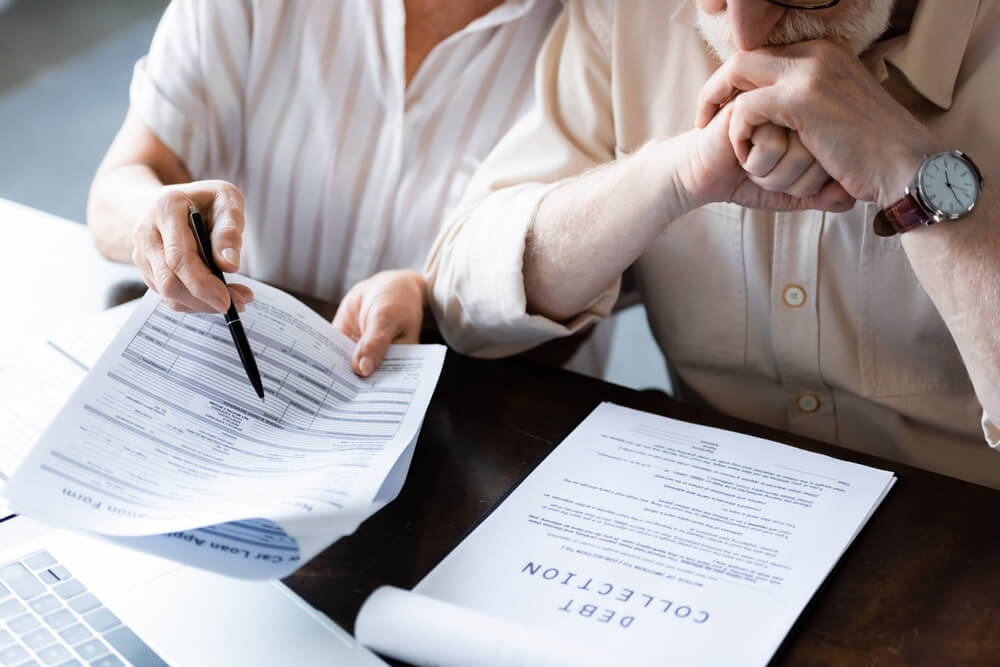One of the reasons people are so wary of dealing with bailiffs or enforcement agents is that they want to protect their families from that situation. It can be a traumatic situation, especially because so many people aren’t sure what their rights are and what bailiffs can take.
In this guide we’ll explore your rights if you owe money to bailiffs, including who bailiffs are, what powers they have to recover debts, and whether it’s legal for them to take your belongings as payment for someone else’s debt.

Why choose YourDebtExpert?
- Write off unsecured debts over £5,000
- Stop interest and charges soaring
- Reduced payments from £85 per month
Who are bailiffs (enforcement agents)?
County Court bailiff
As the name suggests, County Court bailiffs are directly employed by the County Court of England and Wales. They’re primarily used to enforce something called a County Court Judgment (CCJ). A County Court Judgement is a kind of court order creditors can apply for in order to force you to repay money owed.
Sheriff/High Court enforcement officers
High Court enforcement officers are employed by the High Court, but they also work for Sheriffs Courts in different regions across the UK. A High Court enforcement officer will also enforce CCJs, however if the judgment involves debts over £600, it will then be passed to the local High Court.
Magistrates Court bailiff
Magistrates court bailiffs report directly to the clerk of the local Magistrates Court, and mainly collect magistrates court fines related to criminal offences like public order offences and antisocial behaviour.
Private bailiff (or enforcement agent)
Private bailiffs aren’t employed by the Court. Instead, they work on behalf of private companies – like a bank, mobile phone company, or the local council.
They’re also known as certificated enforcement agents, which means they have an enforcement agent certificate that entitles them to collect debt.
A private bailiff or certificated enforcement agent will collect a range of debts, like unpaid bills, outstanding parking fines, and income tax and council tax arrears.
What powers does a bailiff company have to recover debts?
A bailiff or debt collector doesn’t have any specific powers that help them collect debts. Instead, they use a tactic of regular communication to encourage people to repay what they owe.
Debt collectors will typically start by contacting you in writing to notify you that they will be attempting to collect your debts, including giving you information on who the original creditor is and how much money you owe.
They may then begin contacting you over the phone or by email about your debts, although they can only do so at certain hours of the day. If you still haven’t come to an agreement to repay your debts, they may eventually visit your home, but they need to notify you first.

How we helped Paige
It was literally the best decision of my life, and it has actually changed my life, cheesy as that sounds, it has changed my life.
Paige , IVA Customer
Can bailiffs force entry?
Bailiffs and enforcement agents are only allowed to enter your home via ‘peaceful entry’; that means through an unlocked door, a gate, or a detached garage or loading bay, and only if they have your permission.
In general, bailiffs aren’t legally allowed to force entry into your home. If bailiffs enter your home illegally, whether through a front door or by climbing a wall or garden fence, you are entitled to lodge a complaint.
Can enforcement agents take control of goods?
If a bailiff arrives at your home in legitimate circumstances – if you have a CCJ against you, for example – then they have the ability to seize your property as a way of raising funds for your creditors.
Items bailiffs can take include:
- Clothing
- Furniture
- Household equipment
- Domestic goods
Controlled goods agreement
A control of goods agreement is an arrangement between a bailiff and a debtor (the person who owes money). Under the controlled goods agreement, bailiffs will take control of certain property that they can potentially sell to recover money, i.e. by clamping a hire purchase vehicle.
You can come to a finance agreement with the bailiff to regain control of the goods in question by offering to repay the money you owe, whether that’s upfront or over a longer period of time.
Can a debt collection agency seize my property for someone else’s debt?
A common question people ask is whether bailiffs can take someone else’s property as a means of recovering a debt they are owed; seizing a car from a mother in relation to her son’s debt, for example.
While it’s perfectly legal for a bailiff to seize certain goods as a way of raising funds to recover unpaid debt, these goods should only belong to the debtor.
If a bailiff tries to seize someone else’s goods to take care of a debt that individual doesn’t owe, they are breaking the law. You are perfectly entitled to tell the bailiff to leave your property. If they leave with the goods, you will have grounds for a complaint. You can get more information on dealing with bailiffs from Citizens Advice and other debt charities.
Where can I find reliable debt advice on dealing with bailiffs?
If you’re barely managing to keep on top of your bills and are worried that bailiffs will soon by on the way to collect debt from you, we know how you feel.
At Your Debt Expert, we help thousands of people every year who find themselves in that position. We let them know their rights, offer them support on dealing with bailiffs, and help them find debt solutions to deal with the underlying financial problem.
To get back on top of your finances and help protect yourself from bailiffs, talk to a friendly adviser at Your Debt Expert today.
Where can I get more advice on Can bailiffs take my belongings for someone else’s debt? and other debt solutions?





